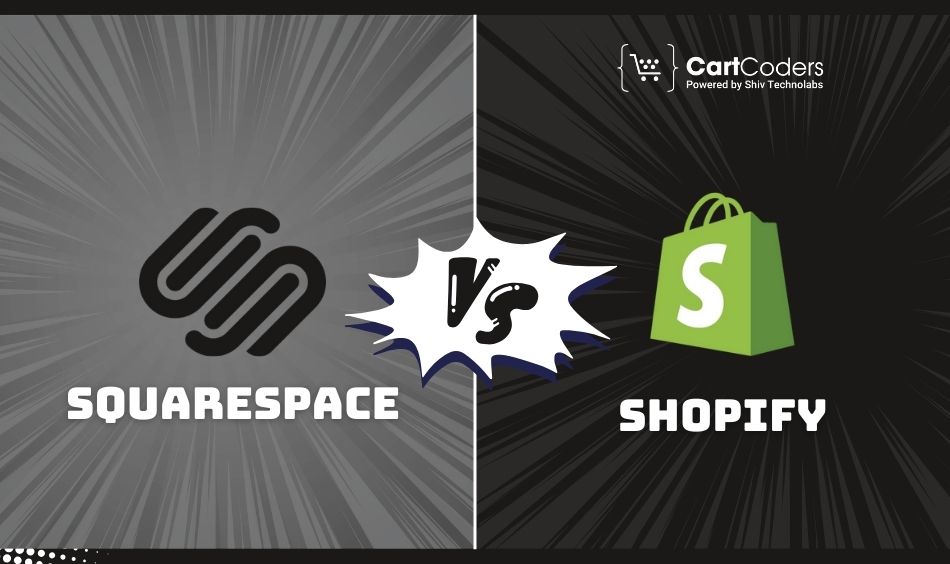Custom Engagement Solutions
Unlock tailored solutions with a free, no-obligation strategy session.
Expert Developers & Engineers on Demand
Scale Your Team with Skilled IT Professionals
Expert Guidance for Digital Transformation

Choosing the right platform for your online store is a business decision that affects sales, growth, and daily operations. In 2026, two platforms will continue to dominate this discussion: Shopify and Squarespace.
Both allow you to sell products online, accept payments, and manage orders. However, they are built with very different goals. One is focused on selling at scale, while the other blends website design with basic ecommerce features. This difference becomes more visible as customer expectations, payment methods, and store complexity increase.
Many businesses choose a platform based on price or design alone, only to face limits later when product counts grow, shipping rules change, or checkout needs more control. This comparison is written to help business owners, founders, and ecommerce teams make a clear decision before committing time and money.
In this guide, we compare Shopify and Squarespace across real store needs such as setup, pricing, selling tools, checkout, shipping, growth support, and migration planning. The goal is simple: help you choose a platform that fits your business direction in 2026 and beyond, without forcing a rebuild later.

Shopify is an online store platform focused on selling. It gives you tools to list products, manage orders, accept payments, and grow your sales. Many brands use Shopify because it works well for stores of all sizes, from small catalogs to big inventories.
With Shopify, you can sell:
Shopify is built for selling and store performance first, which is why many online brands choose it when sales and conversions are key.
Squarespace began as a website builder that lets users make attractive, content-rich sites. Over time, it added basic selling features, so you can list products and accept payments.
Squarespace works well if:
Squarespace makes it simple to add a store to a website, but it’s not as strong in advanced selling features as Shopify.
Shopify is made to handle growing catalogs and larger inventories. You can add hundreds or thousands of products with multiple variants, locations, and tag systems that make filtering easier for customers.
Shopify lets you:
This means Shopify helps stores convert visitors into buyers, which is one of the core goals of ecommerce.
One reason Shopify leads in eCommerce comparisons is its marketplace of apps. You can add tools for:
These extensions help stores grow faster and add functionality without custom code.
Squarespace is known for beautiful, ready-to-use templates. If your online presence is also about visuals, stories, or brand identity, Squarespace lets you showcase your work and products together.
Many creators, photographers, and service businesses choose Squarespace because it combines site design with product selling.
Squarespace includes:
These are enough for stores with a small number of products, or for sellers who do most business offline but want a presence online.
The Squarespace editor lets you drag and drop page elements, which makes basic page setup fast. You can add galleries, text, forms, and store blocks without complicated menus.
Choosing a platform isn’t just about features — it’s about cost and value. Let’s break down how pricing works for both platforms.
Shopify pricing is tied to ecommerce capability, meaning you pay based on how advanced your selling needs are:
With Shopify, you may pay app fees for extensions like email marketing, subscriptions, or advanced analytics.
Key cost drivers for Shopify:
Shopify gives you more selling tools as you move up plans.
Squarespace pricing bundles website and store tools together. Its pricing is typically lower at entry level compared to Shopify. You get website pages, blog tools, and basic store features in the same plan.
Squarespace cost basics:
However, as your store grows and you need more selling features (like advanced shipping or more payment options), limitations may appear.
When you build an online store, setup experience matters. Let’s compare how setup feels on each platform.
Shopify guides you through a step-by-step setup focused on selling. You start with:
Shopify’s dashboard is made for stores, so every step supports selling and order management.
Benefits of Shopify setup:
For first-time sellers, Shopify’s setup may feel more complete for selling online because the steps are meant for store growth.
Squarespace starts with website pages, then adds products as part of your site structure. You set up your store by:
Squarespace’s strengths are in page design and seamless blending of content with store pages.
Good fit for:
If you plan to grow your store later, Squarespace may require manual work to add advanced selling tools.
Your ability to manage orders, sell products, and promote your store depends on the tools available in each platform.
Shopify
Squarespace
Winner for product catalogs: Shopify
Shopify gives more tools for large catalogs and structured product data.
Better payment options can lead to more sales. Let’s see how each platform handles checkout.
Shopify supports many payment gateways worldwide, and offers its own native payment option too. You can:
Shopify’s checkout is designed for selling, with options for upsells, discounts, and abandoned cart recovery on most plans.
Squarespace supports common payment methods but fewer gateways than Shopify. Checkout is simple and works for small stores, but lacks some promotional tools you see in Shopify.
Quick takeaway:
If your goal is to give buyers more choices at checkout and reduce abandoned carts, Shopify offers stronger selling tools.
Managing orders smoothly helps reduce errors and delivery issues.
Shopify
Squarespace
Shopify’s shipping tools are more complete, especially for stores selling across regions.
Shopify and Squarespace both handle basic tax setup, but Shopify gives more control over tax regions and rules for multi-location selling.
Sales depend on how easily you can promote your store.
Shopify includes:
Squarespace has:
Shopify’s marketing ecosystem is broader, giving you more options to connect store performance to sales goals.
Not every online store has the same needs. The right platform depends on how you sell, how often you sell, and how far you plan to take your store.
Squarespace works well when selling is not the main focus of your website.
Choose Squarespace if:
Common examples include creators, consultants, photographers, and service providers who sell a few digital or physical items alongside their main content.
Squarespace keeps things simple and visually consistent, which works well for these use cases.
Shopify fits businesses where online selling is central.
Choose Shopify if:
Retail brands, growing DTC stores, and companies planning scale usually feel more comfortable on Shopify because it supports complex store needs without forcing a platform change later.
Many businesses start small but grow faster than expected. Platform limits often appear later, not at launch.
Squarespace can feel restrictive once:
Shopify is built to handle these changes from the early stages, which reduces the risk of rebuilding your store again.
Checkout experience directly affects sales. Shopify offers more control over:
Squarespace checkout is clean and simple, but offers fewer selling controls.
If you are starting on Squarespace and planning to move to Shopify, a clear plan avoids data loss and ranking issues. Below is a practical migration checklist used by ecommerce teams.
Before moving anything:
This step helps avoid missing data during migration.
Set up your Shopify store before moving data:
This gives you a ready destination before import starts.
Move key store data:
For larger stores, migration tools or expert help can reduce errors.
To protect search visibility:
This step is important for stores with existing traffic.
Before launch:
Testing avoids buyer issues after launch.
After launch:
Early checks help catch issues before they affect sales.
Avoid these common problems:
Planning each step prevents lost sales and broken links.
At CartCoders, we help businesses:
We focus on business goals first, not just platform features, so your store supports growth without future rebuilds.
Both platforms serve real needs, but they solve different problems.
If your plan includes more products, wider reach, or stronger store control, Shopify gives a clearer path forward. If your store supports your brand rather than drives it, Squarespace can still work well.
Projects delivered in 15+ industries.
95% retention rate, building lasting partnerships.
Serving clients across 25+ countries.
60+ pros | 10+ years of experience.